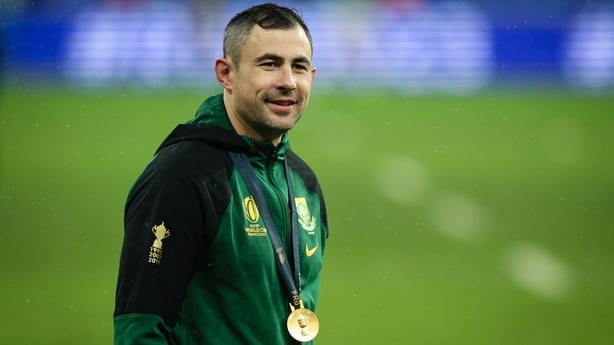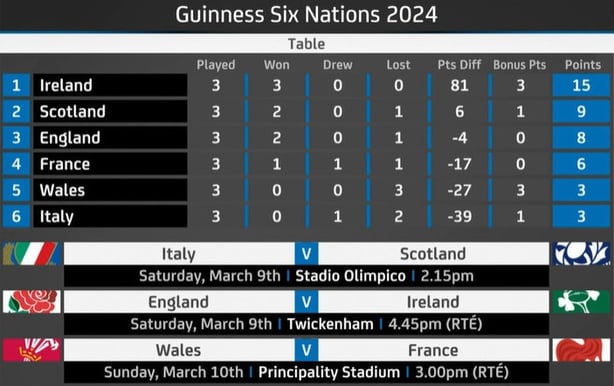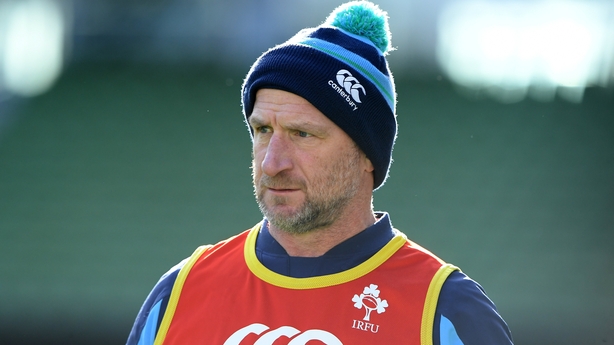A couple of hours after Ireland's 31-7 win against Wales last Saturday, Andy Farrell had half a smirk when he was asked about what preparations they would be making for England and the Felix Jones' 'Blitz defence'.
"It's something we’ve come up against before, and we all know that our lads are coached by the coach that made it up in the first place," the Ireland boss said.
Jones may have brought that aggressive, hard-off-the-line defence to England in January, but as Farrell hinted, its nothing new for this Irish team.
The bulk of this Irish squad will have come across the original version of that 'D' in the last 18 months in their wins over the Springboks in 2022 and 2023, but for the large Leinster core in this group, they've been learning the ins and outs of it for the last few months under its creator, Jacques Nienaber.
The South African's reputation as a defensive specialist has reached mythical levels in recent months, although two World Cup victories in a row will do that.
Leinster's new senior coach has had the media on a string since suggesting that it would take 14 games for him to get his defensive system up and running with the province.
We're suckers for detail, and jumped on that specific 14-week probation period like pigeons on a chip.

"It's very much helter skelter and it’s line-speed, and it puts you under pressure, and I think that’s always what we’ve thrived on as a team, especially over the last year, year and a half," Ireland attack coach Mike Catt says of his experiences going against the blitz defence, which former Ireland international Jones has now brought to England's coaching team since replacing Kevin Sinfield in the role.
"Being able to embrace that pressure and having the skillset to be able to try and break it down, that’s the challenge we have, and I think the boys love that challenge when something like that gets put in front of us.
"It’s not an easy challenge. It’s one that we have to think really hard about and in the moment you’ve got to be calm enough to execute stuff."

Catt has every right to be confident in Ireland's ability to get around that hard defensive line, with wins over South Africa in both 2022 and 2023 proof of concept.
And with Nienaber now part of the Irish system at Leinster, it's allowed the Irish coaches get a look under the bonnet of how it all works.
While Catt hasn't sat down for a breakdown of the system with Nienaber, he says the Leinster players have been able to bring their own expertise into camp.
"Obviously all the Leinster boys have been [working with him] so I've sat down with all of them and we’ve discussed what happens and how it happens," added Catt, who will leave his role as Ireland's attack and backs coach in the summer.
"There's always opportunities [to score] but whether you can take them is another thing.

"I think if you do your homework properly, trying to break it down is still very tough, especially with the physicality that comes with it in terms of the Springboks.
"The nice thing is we were able to do it. We've done it twice against a full-blown South African team so, again, we need to prepare ourselves like those matches."
The 14-game theory wasn't plucked out of the sky, with Nienaber revealing that's how long it took for the system to bed in with the Springboks.
Such an aggressive and high-risk game plan is always going to take time to adjust to and it's no different with Jones and the rest of Steve Borthwick's England coaching team in this Six Nations.
When it's worked, their defensive linespeed has been impressive and impactful, but with a high-risk strategy any mistake could prove costly, as they've discovered at certain points in each game so far.
Both first half tries conceded against Italy in Round 1 saw holes emerge in midfield when the defensive line moved as individuals rather than as a unit while Wales', Alex Mann and Scotland's Duhan van der Merwe have also scored tries off the back of malfunctions in the defensive line.
"So, it might take them seven games. It might take them four games. It may take them 20 games, but we’ll just play the pitch that’s in front of us and we’ll go from there," Catt said, when asked if he thinks England are getting up to speed on that defensive system.
While there have been a handful of costly defensive errors, the real worry for England is around their attack, which has shown no real signs of clarity through the opening three games.
For his first season in charge leading up to the World Cup, Borthwick's strategy went back to basics, playing a kick-heavy game and prioritising their set-piece and physicality to milk territory and entries to the opposition 22.
While it wasn't pretty, it was a means to an end.
In 2024, Borthwick's side appear to be trying to play faster and more expansive, but their strategy around how they want to do it is muddled, with just six tries scored in their three games
Their incredible 22 turnovers and 25 handling errors against Italy, Wales and Scotland.
"They are not going to make as many errors as they did against Scotland, believe me, they are not going to let that happen again," he added.
"They are going to be a much better side than they were against Scotland and we've got to prepare ourselves for it.
"They've got a lot to work on in terms of their defence and their attack. It's not just one thing that they need to do, so they’ll get there and it’s four or five weeks into the competition now and they’ll get better and better each week.
"We expect them to be a lot better than they were against Scotland."
Listen to the RTÉ Rugby podcast on Apple Podcasts, Spotify or wherever you get your podcasts.
Watch Cardiff v Leinster in the URC on Saturday from 7pm on RTÉ2 and RTÉ Player, follow a live blog on rte.ie/sport and the RTÉ News app.


